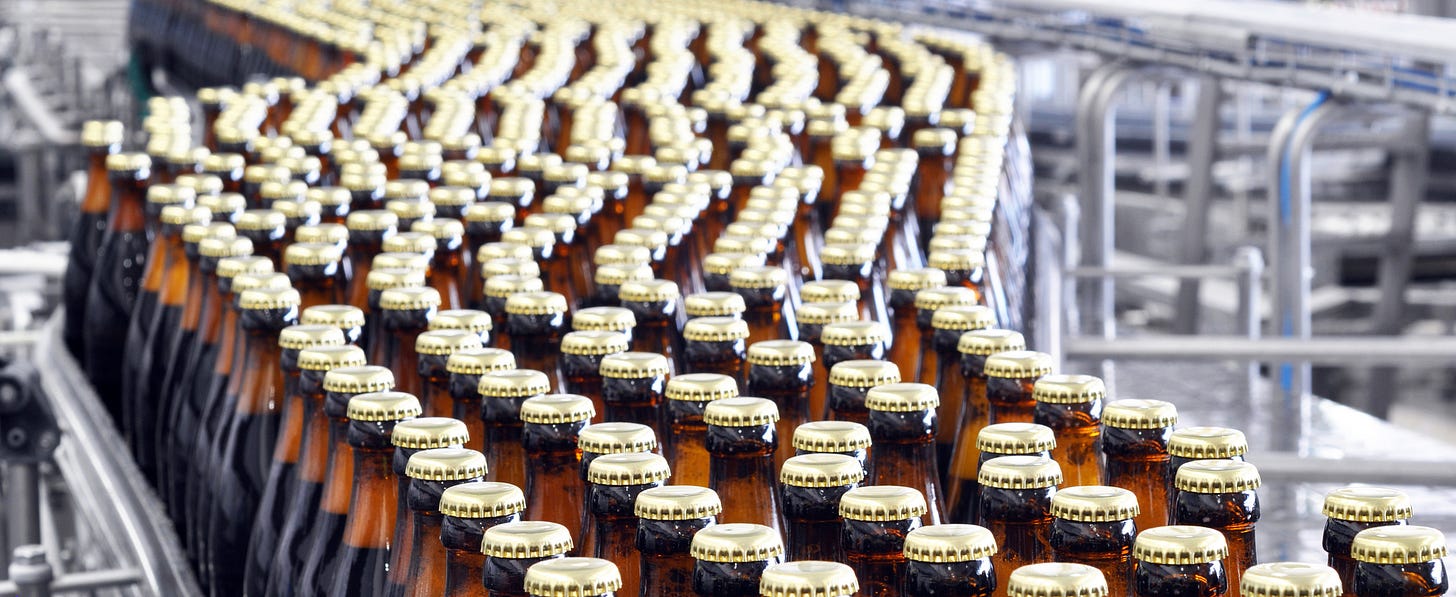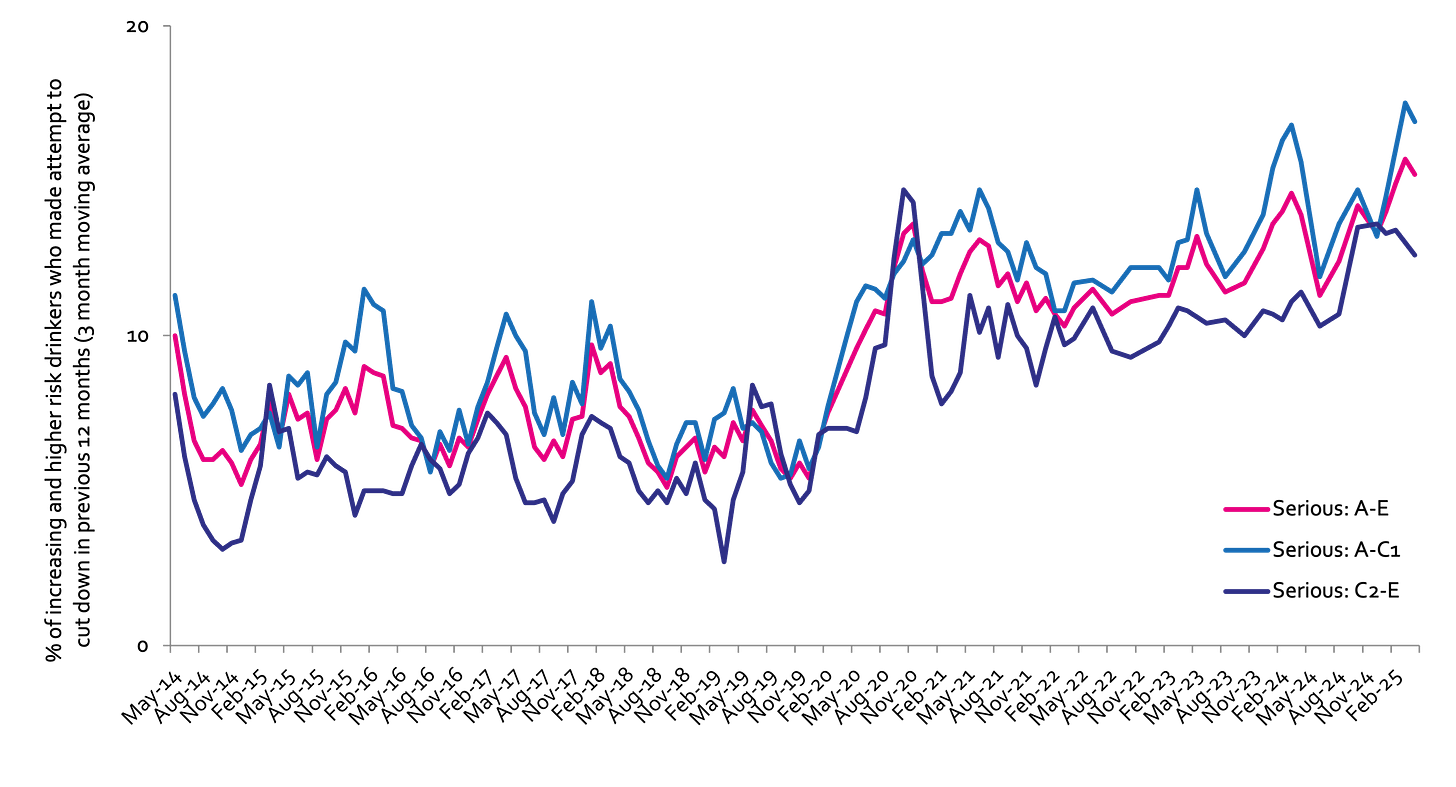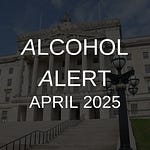Hello and welcome to the Alcohol Alert, brought to you by The Institute of Alcohol Studies.
In this edition:
IAS blogs
Why are young people drinking less? 🎵 podcast feature 🎵
Revealed: UK alcohol industry documents show spread of misinformation
“Partial” alcohol advertising ban - but no MUP - in leaked draft of NHS 10-year plan
“Unprecedented” alliance calls for cancer warnings on alcohol labels
Ireland’s alcohol health warnings to be delayed, says deputy head of government
The drinks industry must not control the narrative
Alcohol industry mounts global pushback amid growing health warnings
Alcohol involved in 1 in 5 complaints to parliament’s complaints scheme
Alcohol is associated with increased risk of pancreatic cancer
MPs push to allow drinking in English Football’s top 5 leagues
Vietnam approves plan to increase alcohol tax to 90%
Alcohol Toolkit Study: update
We hope you enjoy our roundup of stories below: please feel free to share. Thank you.
IAS blogs
To read blogs click here.
Why are young people drinking less? 🎵 podcast feature 🎵
On this month’s podcast we spoke to Professor John Holmes, University of Sheffield, and Amy Pennay, La Trobe University, about their new book: Young People, Alcohol, and Risk: A Culture of Caution.
We discussed the decline in young people's drinking; whether this is continuing into adulthood; factors influencing this decline; and a why this has to be understood as a much broader sociological issue of generational change.
“It's about this idea that young people have a very different perspective on the world. This particular generation, that often gets called Gen Z, have a very particular perspective on the world that is quite different to those that have come before them.” – Professor John Holmes.
Revealed: UK alcohol industry documents show spread of misinformation
A new report by IAS and Scottish Health Action on Alcohol Problems (SHAAP) exploring UK alcohol industry documents in 2024 reveals that these bodies systematically misled the public and policymakers, downplaying rising levels of harm while presenting themselves as responsible actors.
The report – Spin the bottle: How the UK alcohol industry twists the facts on harm and responsibility – analysed over 140 public communications from six leading alcohol companies and industry-funded groups. It uncovers a coordinated strategy of cherry-picking evidence, exaggerating economic importance, and promoting voluntary measures while lobbying against effective regulation.
Despite deaths from alcohol being at record highs, the industry claimed trends were “going in the right direction.” Industry groups cherry-picked data on positive trends such as a decline in youth drinking and took credit for the decline.
“We found a clear pattern of alcohol industry groups seeking to appear responsible while simultaneously causing harm and obstructing the very policies that evidence shows would save lives,” said report author Emma Thompson, University of Edinburgh. “Policymakers must act based on the full picture, rather than following misleading narratives that position the alcohol industry as ‘part of the solution’ to the harm it causes.”
Trade bodies also described themselves as the “backbone” of the UK economy and warned of job losses if health-focused policies like price increases or marketing restrictions were introduced. Yet the report notes that alcohol harm costs over £27 billion in England alone every year, while many industry jobs are low paid. Industry groups also repeatedly argued that the industry is overtaxed and on the brink of collapse, despite Diageo reporting a $6 billion profit in 2024, making it one of the most profitable companies in the country.
“It is shocking to see how much alcohol industry groups claimed to be doing to support health and prosperity while simultaneously creating so much harm,” said Dr Katherine Severi, Chief Executive of the Institute of Alcohol Studies. “This highlights how crucial it is that policymakers are guided by public health, not private profit and misinformation. It is no coincidence that deaths have almost doubled in 20 years during a period of aggressive industry lobbying and governments failing to tackle the problem effectively.”
Key recommendations to the government include:
“Partial” alcohol advertising ban - but no MUP - in leaked draft of NHS 10-year plan
Sky News reports that the 10-year health plan – which is to be published soon – may include a ban on alcohol advertising.
Deputy Political Editor Sam Coates says he received a draft version of the plan, which showed the government wrestling with the idea of introducing minimum unit pricing (MUP), stricter licensing on shops and off-licenses, and advertising bans. However, he has been told that both MUP and licensing restrictions have not made it into the final document.
He says he was not told that the advertising ban has been removed, and that if taken forward, there would need to be consultations and there would be a “big backlash.”
“Of the things they considered, arguably the more impactful stuff has disappeared. All of these things were in drafts of the 10-year plan. Is it that they just lost their nerve?”
Jem Roberts of IAS told The Times:
“We know the three most effective ways to reduce alcohol harm are to increase the price of alcohol, tighter licensing restrictions and bans on marketing. All are backed by decades of international evidence. Restrictions on alcohol advertising would therefore be very welcome, but to significantly reduce alcohol deaths, it must be combined with measures like minimum unit pricing and limits on the availability of cheap, high-strength alcohol.”
The Telegraph reported that health officials said they were “exploring options for partial restrictions to bring [alcohol promotion] closer in line with advertising of unhealthy food.”
“Unprecedented” alliance calls for cancer warnings on alcohol labels
An “unprecedented” alliance of doctors, charities, and public health experts have signed a joint letter to Prime Minister Keir Starmer, calling on the government to compel alcohol producers to include health warnings on their products.
The letter was coordinated by World Cancer Research Fund (WCRF), and stated that:
“The evidence is clear: health labelling on alcoholic drinks is urgently needed in the UK to help save lives. They should carry strong, clear messages about the health risks, which include the risk of cancer, far beyond vague advice like ‘consume in moderation.’”
Kate Oldridge-Turner, the WCRF’s head of policy and public affairs, said:
“Providing alcohol warning labels would empower millions to make informed choices by clearly understanding the risks.”
Professor Sir Ian Gilmore, chair of the Alcohol Health Alliance, said:
“We must look to the fearless work of our neighbours in Ireland whose new labelling policy provides a level playing field for all producers, leaving no room for loopholes or hiding information behind QR codes or tiny print.
“Improved alcohol labelling, including clear health warnings about the link to cancer, is not just a public health measure, it’s a fundamental consumer right. People deserve to know the risks so they can make informed choices about their health. But current labels and weak regulations are keeping drinkers in the dark.”
Drinks industry trade body the Portman Group dismissed the call and said warnings would make drinkers anxious:
“Whilst we do not dispute the link between alcohol and certain cancers, and that drinking at harmful levels is dangerous and increases risks, blanket cancer warning labels are not a proportionate policy measure and do not put the risks into an appropriate context. This can create unnecessary anxiety, eroding trust in health advice and alienating the very people who require support.”
A Department of Health and Social Care spokesperson said they strongly recommend that the CMO guidelines are displayed clearly on labels:
“We recognise the need for more action on the impact of alcohol on health; for too long there has been an unwillingness to lead on this issue. Our plan for change will shift healthcare towards prevention, including through early intervention, to support people to live longer, healthier lives across the UK.”
Ireland’s alcohol health warnings to be delayed, says deputy head of government
In related news, Simon Harris, the deputy head of Ireland’s government, has said the introduction of health-warning labels on alcohol will need to be delayed, because of concerns over trade tariff disputes with the United States.
On Wednesday 25th June he said that:
“We will need to delay that. I think we need to do that for a variety of reasons, most particularly the situation in relation to trade and tariffs.”
He said jobs have to be protected and Irish industry has to be supported “at a really key moment of economic turbulence”. However, he said the delay will be less than five years.
This comes following Ireland’s Enterprise Minister Peter Burke writing to the Health Minister formally calling on her to delay the introduction of alcohol health warnings, which were due to come in in May 2026.
In the letter to his cabinet colleague, Mr Burke expressed concern that the labels would mean increased costs for Irish producers and importers, and potentially add to the consumer price at a time of rising prices.
Study reveals industry strategy to fight against labelling
Relatedly, a new study looked at how alcohol industry stakeholders responded to the EU notification process for Ireland’s proposed alcohol labelling regulations.
It found that industry arguments against health warning labels fell into four main themes:
Lack of evidence supporting the content of health warning labels and their broader use.
Negative trade and economic impacts.
Potential risks to EU governance posed by Ireland’s labels.
The alcohol industry’s self-positioning as responsible actors committed to public health.
The analysis revealed new strategies related to alcohol labelling specifically, including a heightened focus on wording and language, coordination of activities across multiple governance levels, and tailored framing to suit the institutional context.
The drinks industry must not control the narrative
On 01 June, The Guardian published its view on alcohol and public health, highlighting that alcohol deaths are at a record high and that the government’s 10-year health plan is expected to include ways to reduce alcohol harm.
They describe a growing international focus on alcohol policies, and some of the measures on offer to the UK government, including minimum pricing, advertising restrictions, and stricter guidelines.
They also highlight that progress is made difficult by lobbying from the alcohol industry, who are pushing back with advertising campaigns featuring claims that moderate drinking is not harmful.
“While this is in direct contradiction to the WHO’s stance, it may appeal to a public that enjoys drinking. Ministers must ensure that accurate information about risks is out there, too, and that government decisions are guided by health, not lobbying.”
In a letter responding to the article, IAS’s Dr Katherine Severi, said:
“If ministers are ‘staking their reputation on economic growth,’ they need to deal head-on with one of the biggest drivers of premature death and lost productivity, while ignoring spurious claims made by alcohol companies whose profits have for too long trumped public health.
“Alcohol harm costs England at least £27bn a year – almost double what the Treasury collects in alcohol duty. These harms aren’t incidental to the alcohol market; they are intrinsic to it. While the industry promotes ‘“moderate drinking”, evidence shows that its profits and growth depend on the heaviest drinkers. It’s no coincidence that Diageo’s CEO recently described moderation as the industry’s “biggest disrupter”.”
“England urgently needs a national alcohol strategy. Bold, evidence-based measures like MUP must be at its core, with commercial vested-interest groups kept at the margins.”
Alcohol industry mounts global pushback amid growing health warnings
The alcohol industry is fighting back as global health authorities step up warnings about the risks of drinking. Executives from major producers including Diageo, Heineken, and Asahi told the Financial Times they are challenging what they call “inaccurate” science and publicly opposing the World Health Organization’s message that there is “no safe level” of alcohol consumption. Instead, they are promoting messages that emphasise moderation, social connection, and potential wellbeing benefits.
Heineken’s latest campaign frames beer as a remedy to excessive screen time, while Diageo’s CEO Debra Crew stressed the importance of “good science” in policymaking. Asahi’s chief executive argued that moderate drinking has benefits the industry should promote more confidently.
Debra Crew said:
“We are talking with governments to make sure that we are using good science. There is some science going out there that is just not accurate, so we are trying to combat that.”
The fightback comes as alcohol sales decline, with younger generations drinking less, weight-loss drugs gaining popularity, and cannabis legalisation expanding. Wine and spirits brands have been hardest hit, with sharp share price falls reported by Diageo and Brown-Forman. Industry mixed messaging on youth alcohol consumption was also evident in a recent Guardian article, where industry leaders maintained their commitment to market products to younger generations, who they insist remain “very enthusiastic” drinkers.
Industry lobbying is picking up due to September’s high-level UN General Assembly meeting on the prevention and control of non-communicable diseases, where UN member states will vote to agree a political declaration on how to improve global health over the next five years.
Meanwhile, Reuters reported that the U.S. plans to drop guidance on alcohol, described as a “major win” for the alcohol industry. The forthcoming guidelines are expected to include a brief statement encouraging Americans to drink in moderation or limit alcohol intake due to associated health risks. They are still under development and subject to change.
Major industry players Diageo and Anheuser-Busch InBev have lobbied lawmakers throughout the review process, with senate records showing millions spent on lobbying efforts related to the guidelines and other issues such as tax and trade in 2024 and 2025.
Eva Greenthal, a senior policy scientist at the Centre for Science in the Public Interest, said the expected new language was “so vague as to be unhelpful.” Under such a change, the message that even moderate drinking can increase risks, especially for breast cancer, would get lost.
Alcohol involved in 1 in 5 complaints to parliament’s complaints scheme
1 in 5 complaints to parliament’s Independent Complaints and Grievance Scheme involved alcohol, between April 2023 and March 2025, their annual report finds.
The complaints included events outside of parliament, as well as incidents in parliamentary bars.
The report states that:
“Alcohol was notably prevalent in the small number of complaints made under the Sexual Misconduct Policy, with respondents accused of inappropriate and unwanted touching.
“Other cases involving alcohol led to situations that escalated into hostility and aggression.”
The complaints were upheld in every instance where alcohol was a factor.
In December last year, IAS submitted evidence to the Modernisation Committee and called for reform to the alcogenic environment. Our response stated that we think the Committee should focus on tackling the excessive availability of alcohol on the parliamentary estate, as well as the culturally engrained normalisation of drinking during the working day. We recommended that the Committee:
Review the availability and promotion of alcohol in parliament.
Review the adequacy of alcohol and other drug support services available to those working on the parliamentary estate.
Review the policy relating to gifts and hospitality from unhealthy commodity industries to parliamentarians and staffers.
Alcohol is associated with increased risk of pancreatic cancer
Consumption of alcohol may raise the risk of pancreatic cancer, according to a large international study led by the World Health Organization’s International Agency for Research on Cancer (IARC).
Pancreatic cancer is the twelfth most common cancer globally but accounts for 5% of cancer related deaths because of its high fatality rate.
Previous studies have suggested that alcohol has a role in developing pancreatic cancer, however, international experts deemed existing evidence of an association as inconclusive.
This study pooled data from 2.5 million people across Asia, Australia, Europe, and North America recruited between 1980 and 2013.
Researchers found that each additional 10g of alcohol consumed daily appears to increase the risk of pancreatic cancer by 3%.
Among women, consumption of 15g to 30g of alcohol daily – one to two drinks – meant the risk rose by 12%, while men who drank 30g to 60g daily faced a 15% increased risk rising to 36% if drinking more than 60g daily.
Scotland urged to take bold action as alcohol harms remain high
Alcohol harm in Scotland remains worryingly high, according to new data published at the end of the month.
Public Health Scotland figures show adults in Scotland are drinking over 50% more than the recommended limit of 14 units per week, with drinkers averaging 21.6 units. Without intervention, alcohol-related disease is projected to rise by 21% by 2043. Health inequalities are stark, with those in the most deprived areas six times more likely to die from alcohol-related causes.
However, the report shows that the volume of alcohol sold per adult has decreased steadily in recent years, and is at a record low in the time series.
The Scottish Government’s new Population Health Framework sets out a long-term strategy to shift the focus from treatment to prevention. It includes a forthcoming Alcohol and Drugs Plan, which will aim to reduce alcohol’s affordability, availability, and accessibility.
Vietnam approves plan to increase alcohol tax to 90%
In mid-June, Vietnam’s National Assembly approved plans to increase the tax on alcohol to 90% by 2031, up from the current 65%.
The tax rate for both beer and strong spirits will rise to 70% by 2027 before reaching 90% four years later.
The finance ministry has said the aim of the higher taxes is to curb alcohol consumption.
The Assembly also approved a new levy of 8% on sugary drinks that exceed 5g sugar per 100ml of product, which will take effect in 2027 and rise to 10% in 2028.
The World Health Organization said that Vietnam had seized an historic moment to protect youth and community health from unhealthy commodities.
Alcohol Toolkit Study: update
The monthly data collected is from English households and began in March 2014. Each month involves a new representative sample of approximately 1,700 adults aged 16 and over.
See more data on the project website here.
Prevalence of increasing and higher risk drinking (AUDIT-C)
Increasing and higher risk drinking defined as those scoring >4 AUDIT-C. A-C1: Professional to clerical occupation C2-E: Manual occupation
Currently trying to restrict consumption
A-C1: Professional to clerical occupation C2-E: Manual occupation; Question: Are you currently trying to restrict your alcohol consumption e.g. by drinking less, choosing lower strength alcohol or using smaller glasses? Are you currently trying to restrict your alcohol consumption e.g. by drinking less, choosing lower strength alcohol or using smaller glasses?
Serious past-year attempts to cut down or stop
Question 1: How many attempts to restrict your alcohol consumption have you made in the last 12 months (e.g. by drinking less, choosing lower strength alcohol or using smaller glasses)? Please include all attempts you have made in the last 12 months, whether or not they were successful, AND any attempt that you are currently making. Q2: During your most recent attempt to restrict your alcohol consumption, was it a serious attempt to cut down on your drinking permanently? A-C1: Professional to clerical occupation C2-E: Manual occupation
The UK Alcohol Alert (incorporating Alliance News) is designed and produced by The Institute of Alcohol Studies. Please click the image below to visit our website and find out more about us and what we do, or the ‘Contact us’ button. Thank you.
























